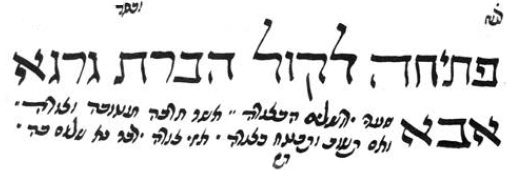

February 15, 2026 ~ Sh TERUMA. HOSENI / SABA


Maqam Jirkah - גרגא / גרכא
1400's
Persian: Chehar-Gah; 'fourth place'.
Lower jins Ajam on F-jiharkah, upper jins Rast on C-Mahour. This is the official scale. However, the universal practice of this maqam begins Ajam on F-jiharkah DESCENDING to Rast on C-rast. Jiharkah melodies are of Western origins.
Associated with Shabbat Vayesse and Shofetim.
~ 15 known pizmonim.
| Section | Pizmon | Page | Song | Commentary | Recordings | Application |
|---|---|---|---|---|---|---|
| 105.31 | אבא שערי ירושלים הבצורה | Petiha | ||||
| Ajam | 207 | 169 | יחיד מגן |
I. Ceezar Fule Yanani Y. Bozo Recording Qaddish H Abraham Zafrani D Binker-Duek- Qaddish |
||
| 254.992 | 204i | נעה מבית אביה |
F. Yanani Recording |
|||
| Rahawi Nawah | 448 | 370 | מפי אל מפי אל |
G. Shrem Fule Yanani G. Shrem Moshe Dwek Dr Isaac S Mordecai |
אל ההודאות | |
| Saba | 462 | 382 | אל חשקי כלו |
Arabic Maury Blanco |
||
| 755 | 204j | שוב ציון ברננה |
Recording |
|||
| 803 | 204h | אשאל עלי יה |
Recording |
|||
| 1103 | מלא עולם מקום אהיה | נקדישך | ||||
| 1104 | יהיה אלוהים עמדי | נשמת | ||||
| 1105 | ישכון כבוד אל בעירם | קדיש | ||||
| 1106 | כל עלמות אהבוך |
|
שועת עניים | |||
| 1107 | מהלל אל שורירו | שמחים | ||||
| 1108 | אומר לאל שיר זמר | |||||
| 1109 | יפיפיה ליבבתיני עד אור בוקר | ממצרים | ||||
| 1110 | אמונתך חוסן ישועות | |||||
| 2434 | יה מלכי שוכן מעונים |
|
||||
| 4020 | 204g | אשמח בטובך מלכי |
Recording |